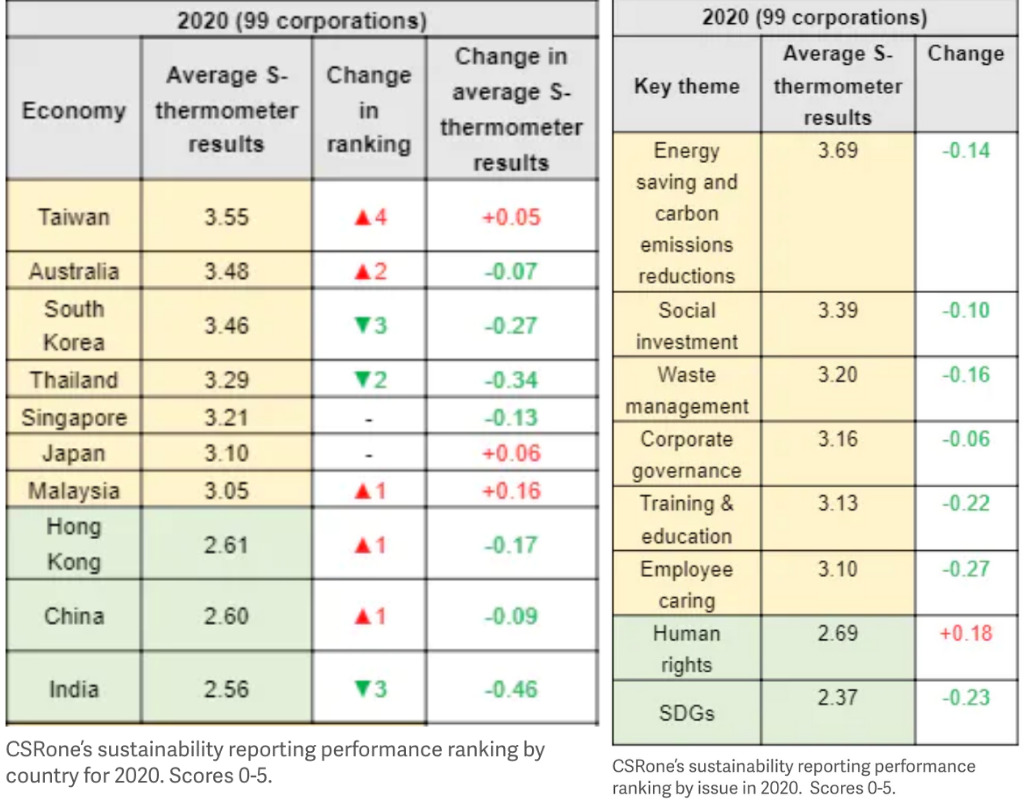Leading APAC Companies Struggled With 2020 Sustainability Performance Reporting Due To Pandemic, Says New Study
3 Mins Read
The findings of a recent study conducted by CSRone show that leading firms in several parts of the Asia-Pacific region regressed in terms of reporting their sustainability performances in 2020 due to the effects of the pandemic.
Called ‘Taiwan and Asia Pacific Sustainability Reports Analysis’, the study highlighted that while sustainability reporting performance improved in 2018 and 2019, in 2020 hardly any reporting on how corporates cared for their employees in the same year was available.
The latest report is the eighth analysis on this topic and was prepared by CSRone, a Taiwan-based leading sustainability consulting and knowledge management platform, along with NCCU Sinyi School, by collecting all corporate sustainable development reports, corporate social responsibility reports, and environment safety reports, also termed as “sustainability reports”. This helps the researchers set up the analysis indicators according to the trends of global sustainable development and organize the data accordingly.
The report has received support from PricewaterhouseCoopers Sustainability Services, along with the Taiwan Institute for Sustainable Energy (TAISE).
For this study, 99 corporate sustainability reports were analyzed including Taiwan Semiconductor, Japan’s Toyota Motor, Singapore’s OCBC Bank, Industrial and Commercial Bank of China, Reliance Industries of India, Malaysia’s Maybank, Thai energy firm PTT, Australia’s Commonwealth Bank, and Korean electronics firm Samsung.
The report evaluated the reporting performance with its ‘S-thermometer’, that gives companies scores from 0 to 5 across a range of metrics.
Among the top countries that failed in disclosing their sustainability performance, India struggled the most, along with Thailand, Singapore, South Korea, Hong Kong, and China.
Senior corporate sustainability specialist at CSRone Jose Miguel Salazar said that in 2020, companies struggled to meet sustainability goals and disclose plans for improvement. In an interview with Eco-Business, Salazar said: “Disruptions from the Covid-19 pandemic may have forced firms to rethink their sustainability goal-setting or reallocate resources to higher priority areas, such as taking care of employees or their communities.”

Disruptions from the Covid-19 pandemic may have forced firms to rethink their sustainability goal-setting or reallocate resources to higher priority areas, such as taking care of employees or their communities
Jose Miguel Salazar, Senior corporate sustainability specialist at CSRone
Despite most countries failing at the reporting, three countries improved despite the pandemic with Taiwan topping the ranking, followed by Australia and South Korea, which ranked first in the 2019 and 2018 studies.
Apart from countries, corporates scored high in reporting energy savings and carbon emissions reductions, social investments, and waste management. Malaysian corporates scored the biggest improvement in sustainability reporting along with Japanese and Taiwanese corporates.
However, in 2020, all three of these sectors showed a performance decline.
While I don’t believe companies have stopped tracking ESG issues within their businesses, maybe the time and expense of reporting was just something that fell off the radar given everything else going on
John Pabon, founder and chief advisor of Fulcrum Strategic Advisors
The only area that witnessed improvement in the pandemic year was the human rights area with Taiwan, Australia, and Korea being the only countries to report respectable, above-average scores for the same, along with being the only nations to be given above-average sustainability reporting scores for aligning their plans with the United Nations’ Sustainable Development Goals.
Founder and chief advisor of Melbourne-based sustainability consulting firm Fulcrum Strategic Advisors John Pabon, said that decline in overall reporting performance was proof that sustainability is being viewed as a nice to have versus a business compulsion.“While I don’t believe companies have stopped tracking ESG issues within their businesses, maybe the time and expense of reporting was just something that fell off the radar given everything else going on.”
Taiwan and Australia also led the way for reporting on employee care, while Singapore, China, Hong Kong, and Indian corporates reported low scores in this area.
Additionally, in the social investment area and corporate governance disclosure, Taiwan and Korea led the way; for waste management reporting, Singapore and Thai firms are way ahead; and Australia, Japanese and Singapore topped in their carbon disclosure.
Lead image courtesy of Corporate Compliance Insights.




